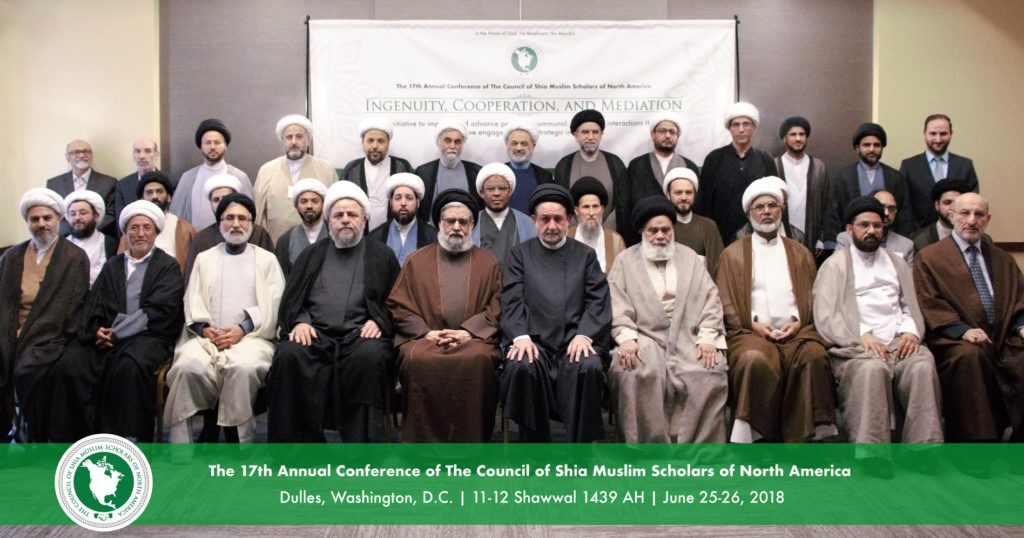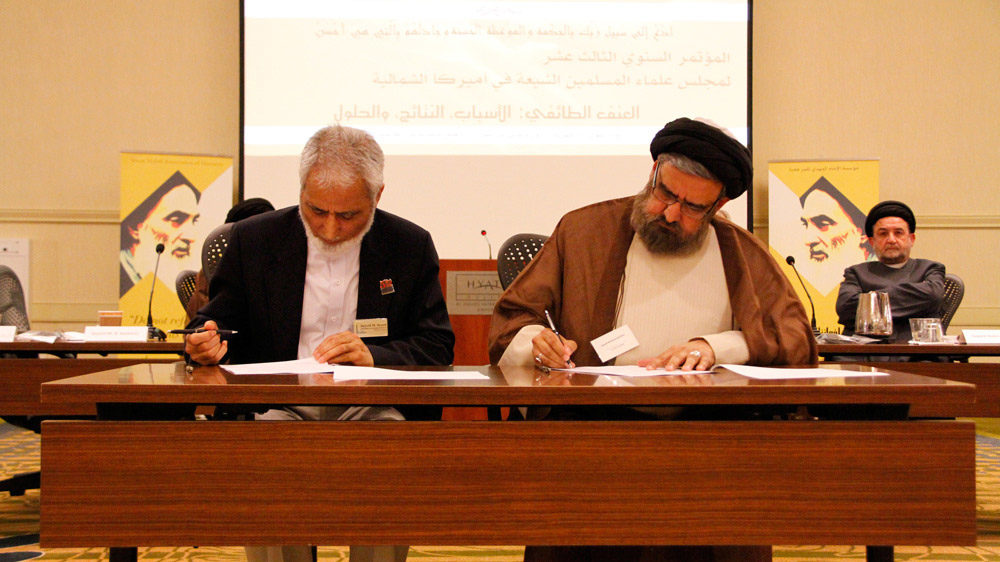Community Cohesion
Home » Community Cohesion
The fifth core function of I.M.A.M. focuses on Community Cohesion, namely:
- Creating a nexus between various places of worship to develop a cohesive support structure for each other
- Facilitating gatherings of scholars and experts to create unified strategies in order to address current issues facing our North American communities
- Mediating and arbitrating conflicts between different groups of believers and places of worship
This core function has been a cornerstone of I.M.A.M.’s activities throughout North America, by visiting Islamic organizations across the continent, hosting programs and conferences, and most notably, by conducting inter-faith and intra-faith meetings and projects. I.M.A.M also supports the Council of Shia Muslim Scholars in North America.
Community Cohesion Online Resources:
Community Cohesion – An Overview
Interfaith and Intrafaith
One of the most important components of the Community Cohesion function can be seen in I.M.A.M.’s participation in intrafaith and interfaith dialogue. Such involvement has manifested in many forms, including collaboration between Sunni and Shia Scholars in the joint support of the Washington Declaration. Interfaith discussions such as these have ranged over a variety of important topics, such as the protection of minorities in the Middle East, particularly the Christians of Iraq, countering extremism in the United States, and how local Muslim communities are responding to the threat of extremism and sectarianism. Additionally, dialogue between faith-based communities has led to a better understanding of the challenges these communities face and the realization that these challenges are similar, if not the same. This dialogue has created opportunities for communities that have overcome these challenges to work with those who are still facing them for the betterment of the nation.
The Council of Shia Muslim Scholars in North America
After the founding of the Imam Mahdi Association of Marjaeya (I.M.A.M.), the liaison office connecting Shia Muslims in the United States to their Supreme Religious Authority, one of I.M.A.M.’s priorities and objectives was to focus its attention on the scholars, preachers, Islamic centers, preaching activities, and taking care of the believers . To this aim, Sayyid Muhammad Baqir al-Kashmiri, Chairman of I.M.A.M., toured a number of cities and states, coordinating with the honorable scholars in an effort to revitalize the Council’s activity.
The Vision of the Council of Shia Muslim Scholars of North America is to support the Shia Muslim communities in North America in matters of spirituality, religion, guidance, and leadership. The aim in doing so is to guarantee the preservation of their religious identity alongside an appreciation of their noble traditions and the need to promote citizenship.
Its mission is to work toward supporting Shia Muslim communities in North America, accomplishing desired objectives by exchanging skills and experiences among scholars and preachers, offering direction and advice to reinforce the standing of the Shia Muslim community in its coexistence with other communities by taking all possible measures, using model mechanisms and advanced means, and cooperating with all qualified organizations and entities to that end.
For more information about the Council of Shia Muslim Scholars in North America, click here.

The Washington Declaration
This declaration was made on the occasion of the thirteenth annual conference of the Council of Shia Muslim Scholars of North America entitled “Sectarian Violence: Its Origins, Results & Solutions,” which was held on the twenty-forth of the month of Shawal, 1434 A.H. – the first of September of 2013 – in Washington D.C. In attendance were groups of religious scholars, intellectuals, academics, leaders, the imams of centers, and the presidents and chairs of religious and community organizations of diverse Islamic sects. Discussions were held surrounding a number of important issues including the dire situation of unrest, destruction, genocide, and refugees that is being witnessed around the world, and more specifically, in the countries of Muslim populations, all a result of political agendas in the garb of religion and sectarianism. The conference attendees agreed upon a number of issues, decisions and agreements which, with the support of God Almighty, would serve to protect the sanctity and the freedoms of mankind, bring people together, improve the security, and safeguard coexistence.
To learn more about the Washington Declaration, click here.

Mediation Services
In circumstances where the mediation of religious scholars is sought, I.M.A.M. provides access to knowledgeable figures dedicated to resolving disputes, reconciling aggrieved parties, and achieving amicable solutions based on the best practices and principles of the Islamic faith.
To request mediation services, click here.
Humanitarian Assistance
I.M.A.M.’s Humanitarian Services are designated to collect and raise funds such as Sadaqa, Fidyah, Kaffarah, Feeding the Fasting in Need, Zakat, Zakat al-Fitrah, and general donations for the purpose of humanitarian aid to support and help the poor, the orphaned, the unprivileged and all those whose situation requires assistance. Through these services, I.M.A.M. can support and uplift the moral, spiritual and educational status of such individuals, locally or internationally, and directly or in cooperation with other relevant 501(c)3 non-profits which have better logistical access to serve on the ground.
Adhering to its firm belief in Faith and Integrity as core values, I.M.A.M. continuously surveys the state of the believers in need living all around the world, especially in United States of America.
In the United Sates, we have witnessed many natural disasters over a very short period. In 2017 alone, several major hurricanes affected the southern portion of the United States, especially in Texas, Florida, and Puerto Rico. Later, Hurricane Ida in Louisiana, the COVID-19 pandemic, and the latest Pakistan floods. I.M.A.M., in coordination with the Najaf office, is authorized to allocate khums funds toward hurricane relief efforts in addition to general donations made particularly for this cause. To this effect, an Emergency Relief campaign was enacted to aid brothers and sisters in affected areas.
My Orphans
My Orphans coordinates with its counter parts across the United States to raise awareness of this critical need. All donations to My Orphans are 100% tax deductible. My Orphans is a humanitarian initiative developed in response to the need of assistance in tending to the orphans in the United States . This project is maintained entirely through volunteer efforts and 100% of all donations go to the orphans with absolutely no deduction for operative costs or fees, which are covered by I.M.A.M.’s operational expenses. All donations to My Orphans are 100% tax deductible. For overseas orphan support, as mentioned earlier, I.M.A.M. collaborates with other 501(c)3 non-profits which serve with better logistics on the ground.
To make a My Orphans – Khums donation, click here.
To make a My Orphans – General donation, click here.
Shia-Sunni Alliance Forum – SSAF
In February 2020, through collaboration between ADAMS and I.M.A.M., and with the support and participation of the most active and well-known Shia and Sunni scholars and Imams from different parts of the United States, the Shia-Sunni Alliance Forum (SSAF) was born after a 3-day retreat in the Washington D.C. area.
SSAF’s vision is focusing on important issues for American Muslims, including the benefits of Muslim unity, misconceptions about each other, challenges for unity, and worshiping together irrespective of differences.
SSAF corporates, supports, and encourages all imams to establish united activities, mutual programs, and family based social initiatives under “One God, One Umma, and One Mission” to bring us all together irrespective of differences. This would help promote tolerance, brotherhood, and solidarity. Of course, COVID-19 challenged this newborn noble project, but it continued with the least of possibilities and restarted again. Here is some further information about the aforementioned initiatives and others that are coming soon:
Muslim Scholars Work Toward Unity at SSAF Retreat
Remembering Prophet Muhammad (pbuh&hp)
Meeting Dr. Shaykh al-Issa, Chairman of The Muslim World League
Solidarity Gathering for New Mexico Muslim Community
Imam Magid meets Grand Ayatullah al-Sistani: Say, “ourselves” rather than “our brothers”
https://www.instagram.com/reel/ChkY8Xpujj5/?igshid=ZjA0NjI3M2I=
A wonderful sample of collaboration between Shia and Sunni
https://www.instagram.com/reel/ChfAG9WraGc/?igshid=ZjA0NjI3M2I=

